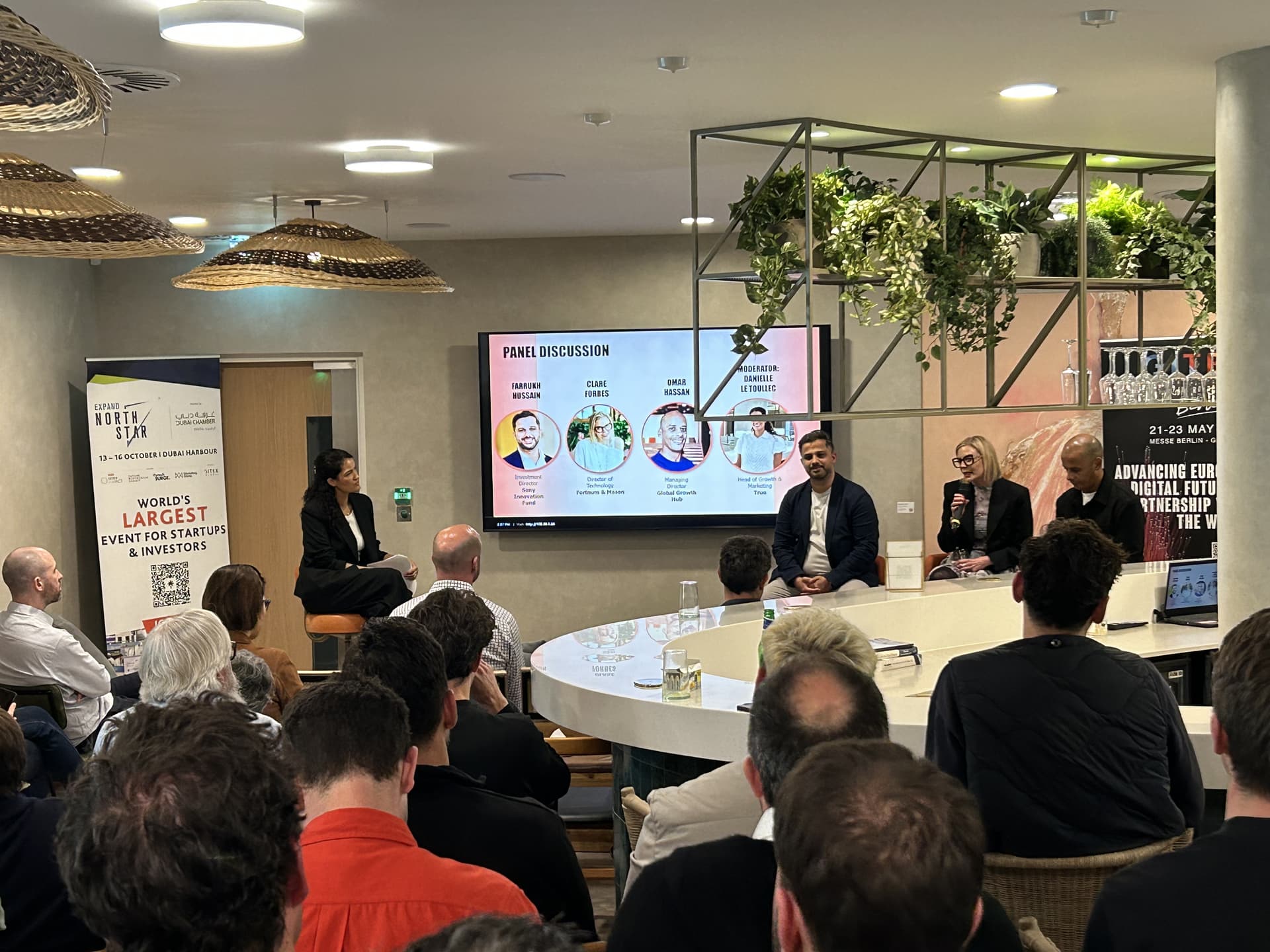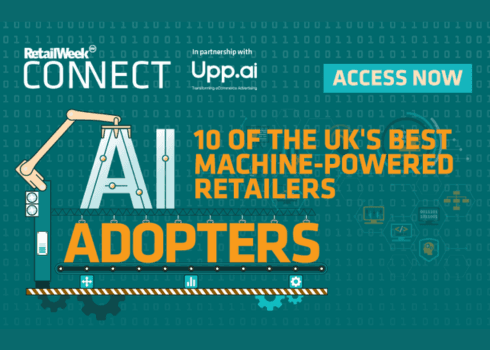RetailJam recently brought together the UK Retail community of thought leaders and innovators to Oakley Court in Berkshire to discuss the future of retail and celebrate innovation in the industry. We had the pleasure of being a Network Partner for the event – we curated then hosted The RetailJam Start-Up Showcase featuring four exciting start-ups from our ecosystem. These included Sociate AI, Quin Engine, Made with Intent and Aistetic.
From the talks and workshops showcasing latest trends, technologies, and strategies driving the future of retail, we’ve distilled the key takeaways into four themes: Ethical Sourcing & Sustainability, AI & Digital Transformation, Omni-channel Strategies, and Customer Insights & Engagement. To put each point into context with what we’re seeing on the Innovation Advisory side of True, I sat down and had a chat with Gursh Mendhir, Innovation Principal. Let’s dive in!
1. Ethical Sourcing & Sustainability
Ethical sourcing and sustainability were at the forefront of discussions at Retail Jam 2024. In her talk on ‘Leveraging a challenger mindset to strengthen your brand’, Nicola Matthews, UKI Head of Marketing at Tony’s Chocolonely highlighted how the company uses its product as a storytelling vessel to raise awareness on important issues in the cocoa industry, like child labour and deforestation. This approach includes unique product designs that symbolise the countries of West Africa and partnerships that promote their mission, such as collaborations with events like Glastonbury.
On the panel titled ‘What new approaches and technologies are helping to deliver sustainable supply chains?’, Riverford Organic Farmers’ Head of Sustainability, Zac Goodall, emphasised the importance of growing the business sustainably. Key priorities include reducing carbon emissions, improving supply chain monitoring, sustainable packaging and managing climate risks. Riverford emphasised the importance of leveraging innovative businesses to gather essential data from farmers, facilitating practices like regenerative agriculture and allowing for better comparisons across different product types through platforms like the Soil Association Exchange.
In the same panel, Finisterre’s Head of Positive Impact, Adele Gingell, discussed the trend towards circularity, highlighting their successful resale platform and the launch of circular design products that reduce the use of virgin materials and enhance product longevity. However, scaling these efforts sustainably while connecting the future product pipeline with environmental impact reporting remains a challenge.
Danielle: Gursh, how does this fit into the broader trends we're seeing in ethical sourcing and sustainability?
Gursh: Technology, specifically a combination of computer vision, satellite data and AI models, will play a key role in providing essential data to underpin sustainability in a profitable manner, to ensure accuracy and precision of farming, pesticide control and broader agricultural practices. Having a view of supply chain activity will be increasingly important for ethical sourcing, relying upon technologies like blockchain for greater transparency and traceability.
2. AI & Digital Transformation
The integration of AI into business practices was a hot topic. On the panel, ‘The road to creating a consumer-centric, personalised, omnichannel journey’, Ghanasham Apte, Head of Data Science at BT used the analogy of AI as "topsoil on an already fertile garden”, emphasising that AI should enhance rather than replace existing good practices. He warned against relying on AI to solve fundamental problems, highlighting the need for a solid foundation.
In a fireside chat on ‘AI in retail - hype vs. reality’, Tom Betts, Group Data Director at Kingfisher, illustrated the importance of a structured approach to innovation. He shared the success of ‘Hello Casto’, a DIY assistance service built on a proprietary AI framework. This service exemplifies how AI can draw on the best features of various models to provide valuable customer support.
Emilie Maunoury, Commercial Director, Store Division & Pure Players at Clarins discussed the benefits and challenges of using AI for SEO and content creation. While AI can enhance recommendations and personalisation, maintaining brand voice and tone, especially for premium brands, requires human supervision. This underscores the need for a human-in-the-loop approach to ensure AI-driven content aligns with brand guidelines. Additionally, Clarins' personal shopping service bridges online and in-store experiences by allowing virtual try-ons and product recommendations, driving increases in Average Order Value, , Units Per Transaction, and Net Promoter Score.
Danielle: Can you elaborate on how AI integration aligns with the trends discussed at Retail Jam 2024, particularly in enhancing business practices and consumer experiences, and what are the key factors for its successful implementation?
Gursh: As we cut through the noise and hype of AI, we discern the reality of AI’s potential for corporates across multiple use cases. Particularly hot topics for AI to create near-term bottom-line impact in retail (especially when first-party data requirements are limited) are new product development, marketing effectiveness and consumer insights. Although ultimately, for long-term impact, building a sound in-house data platform is key for accurate insights – especially in areas like demand forecasting. There are some exceptions – for example, with the rise of large language models and generative AI, technology tools are increasingly able to create and iterate content in line with brand guidelines even without much first-party data.
3. Omni-channel Strategies
The omni-channel approach was another critical theme, with discussions on providing a seamless customer experience across all touchpoints. At the panel on ‘The road to creating a consumer-centric, personalised, omnichannel journey’, Emilie at Clarins highlighted the challenges of achieving a 360-degree view of the customer, particularly when selling through wholesalers. Clarins tackled gaps in the customer journey by implementing clienteling apps and personal shopping services in-store, capturing POS transactions to enhance customer insights.
Lizzie Harris, Customer Director at B&Q, emphasised the value of in-store experiences for understanding customer behaviour, which online platforms might miss. B&Q focuses on consistency in customer experience across their marketplace, prioritising customer retention as a key measure of success. Although they see potential in generative AI, they remain cautious about its customer-facing applications, preferring to use AI throughout the value chain. Harris noted that 90% of transactions begin online, making sound data-driven decisions crucial, while ensuring a human-in-the-loop approach for customer-facing elements.
Ghanasham at BT discussed the challenge of integrating data across departments to build an omni-channel view. BT transitioned from a pure data lake to creating domain-specific data products, ensuring data cleanliness and usability before integration. Apte also emphasised the need for process alignment across different organisational domains to solve both organisational and data problems effectively.
Danielle: How do these insights about omni-channel strategies reflect the broader challenges and opportunities in the current retail landscape?
Gursh: The biggest challenge we see in our corporate partners’ businesses is online-offline attribution – closing the loop between a customer seeing an ad online and subsequently making a purchase in-store. With the rise of retail media, ‘closing the loop’ is not just imperative for retailers to understand their own return on ad spend, but also for third party brands within the retail media network to understand the return on ad spend.
4. Customer Insights & Engagement
In his keynote on ‘Keeping the attention of existing customers while driving new customers’, Sam Dickson, Vice President Commercial Strategy, Own Brand and Operations at Asda highlighted the importance of customer insights in driving business transformation. Asda employs various methods to gather customer data, such as focus groups, surveys and loyalty programmes. These insights help forecast problems and solutions, ensuring that business changes align with customer needs.
Nicola (Tony’s Chocolonely) stressed the role of product branding and partnerships in communicating their brand mission. Tony’s uses creative sampling methods and collaborations to increase awareness and engage customers, demonstrating the power of storytelling in building brand loyalty.
When it comes to customer engagement, we can’t go without mentioning TikTok Shop. There were over 33M social shoppers on TikTok in 2023, up more than 40% from 2022. According to YipItData, TikTok Shop's revenue went from $261 million in October 2023 to $349 million in December 2023, and whilst the rising fees for sellers are having an impact on growth, it is a core driver for consumer brands especially beauty and supplements. Mark Ross from Konsort Social led a workshop on TikTok Shop, emphasising the importance of building communities and leveraging viral networks for social commerce. He outlined a four-step process for scaling TikTok Shop: setting up and connecting with Shopify, getting creators, building a community, and ramping up with paid strategies. He noted the platform is ideal for products around the £10-£60 mark and increasing popularity of bundles, however there is a current focus on discount-heavy products.
In the final panel of the day, ‘2024 and beyond: driving innovation to stay ahead of the curve and deliver value to consumers’ Ian Howes, Director of Logistics & Fulfilment from Sainsbury’s highlighted the people challenges in innovation, particularly in the labour market. Sainsbury’s is at the early stages of AI and ML adoption, currently at a ballpark of 25% processes automated. They are partnering with DHL on their innovation roadmap with a plan to roll-out Stretch bots from Boston Dynamics later this year, for tasks like container unloading, enhancing both efficiency and colleague safety. Our winner of the Start-Up Showcase, Yasmin Topia from Sociate AI emphasised the need to create online destinations for shopping as Search continues to change rapidly. Making the consumer journey more conversational will be more engaging for customers, especially as more people are shopping via social and blogs.
Danielle: Considering the diverse methods for customer engagement and insights discussed, what do you think are the most promising strategies for retailers moving forward?
Gursh: Traditional methodologies for gathering customer insights, for example focus groups, are subject to confirmation bias and response bias. Digital twin technologies, such as those offered by Native AI, create synthetic representations of your customer base. We are also seeing the rise of user-generated content and social commerce, with BuyWith particularly promising as a method by which to combine the two, offering a way for brands to connect authentically with their customer base at the same time as growing revenue.
As the retail landscape continues to transform, insights on the future of the industry and the role of technology will be crucial for businesses aiming to stay ahead.
Want to explore how innovation can help your company stay ahead in a competitive environment? Get in touch with us here.
For more takeaways from the Innovation Team from the day, check out our post here.


